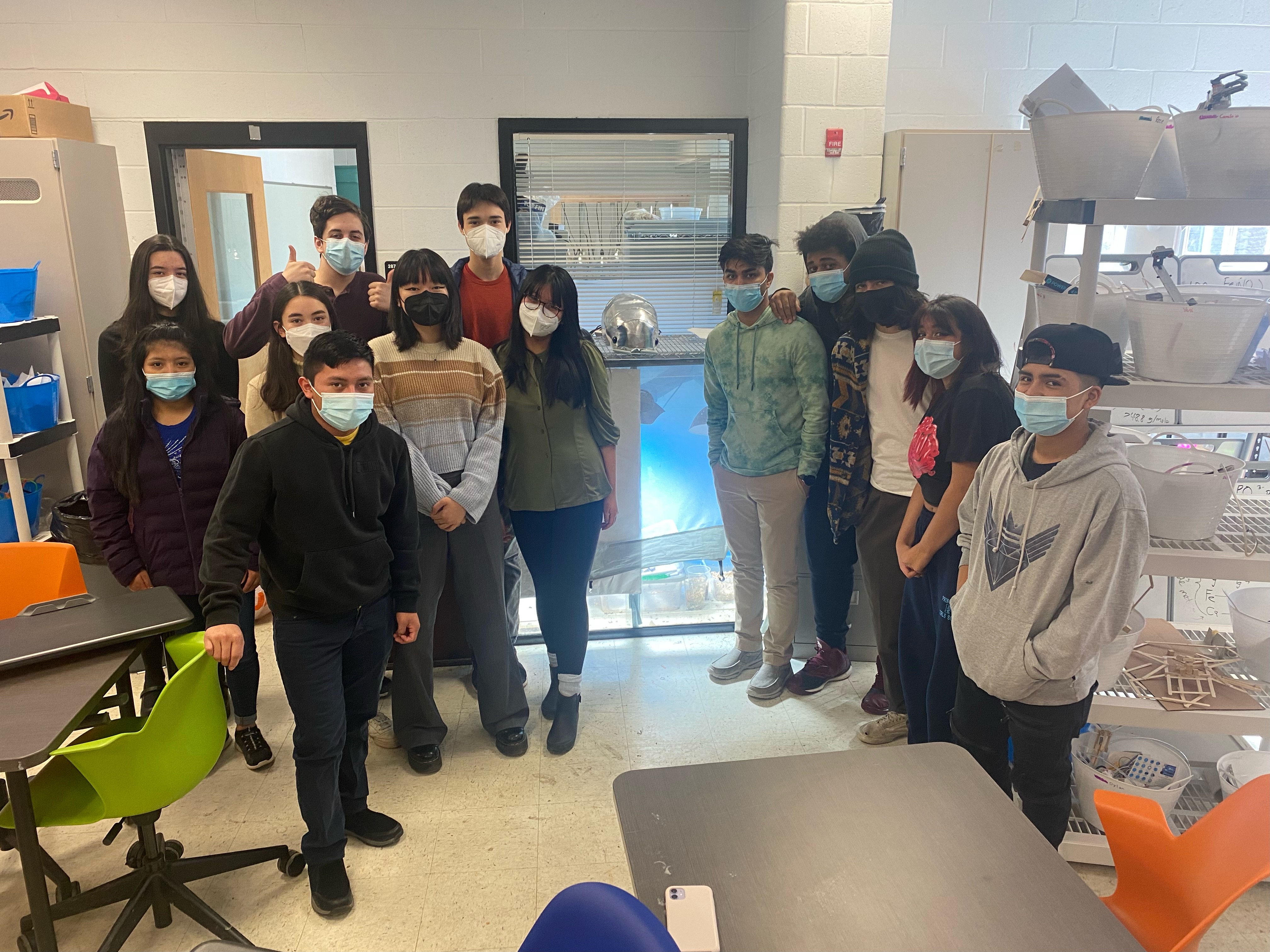PHS wins $100,000 grand prize in Samsung “solve for tomorrow" competition
April, 2022
On April 25, a group of PHS students presented a research project for the Samsung “Solve for Tomorrow” competition in New York City. The competition encourages students from across the country to develop creative solutions to real world problems, and the winner receives a grand prize of a $100,000 grant for their research. Through the development of a creative new way to use black soldier flies to dispose of food waste, the Princeton High School team has taken themselves all the way to the final ten in the competition.
“It’s a technology based competition where you integrate technology into some solution to fix a problem of your choice. And for us, [that problem] was food waste,” said Ngan Le ’23, a member of the team. “A big part of this competition includes sustainability. And for the U.S., food waste is one of those issues that we don’t really talk about. It’s a, you know, out of sight, out of mind kind of thing.”

Instead of simply throwing out food waste, the “Solve for Tomorrow” team has experimented with the use of black soldier flies as an alternate method of disposal. Black soldier flies are resilient insects which are able to effectively break down a wide array of food waste, regardless of how rotten it is. Because of this, soldier flies have the potential to greatly decrease the release of the potent greenhouse gas emissions which stem from food waste.
“Once food is put into a landfill, it decomposes anaerobically, without the presence of oxygen. Because of that, you have bacteria called antigens that break down the food and produce methane, which [causes] more warming to the atmosphere than carbon dioxide,” said Mark Eastburn, a science teacher at PHS and the advisor for the “Solve for Tomorrow” team. “Black soldier flies can prevent this because they will eat any kind of food waste and turn it into protein and fat which then can make great food for pigs, chicken, and fish.”
On top of being able to effectively dispose of food waste, the flies also have a very high oil content, something which the team has been experimenting with as well.
“We’ve discovered that the oil makes some pretty good soap and can replace palm oil in many cosmetic products,” said Eastburn. “We’ve got several different soap recipes to try and we’re going to try a hand cream as well. [Normally] these products use palm oil, which is terribly destructive to the environment.”
The replacement of palm oil in everyday cosmetic products could potentially have a significant impact on the environment. Unlike the oil produced by the soldier flies, which has a very low carbon footprint, the plantations used to make palm oil are very harmful for the environment and have caused the destruction of vast amounts of rainforest. Because of this, the members of the team hope that the project does not end after the “Solve for Tomorrow” competition draws to a close.
“I hope that we’ll be able to make high quality soap that people will like, and that hopefully we can also actually start offering this as a serious product in the future,” said George Kopf ’23, another member of the team, and one of the presenters who pitched the project to Samsung.
Eastburn also believes that this project has the potential to go further in the future. He believes that making products from bugs can be a solution to many societal challenges which doesn’t bring with it very many environmental consequences.
“I would really like to see the project expand because this is the future,” said Eastburn. “Princeton Township recently got rid of the waste collection program that they were running, [so] we could potentially serve as a community resource [and] as a disposal area for food waste that then we can then repurpose into some very valuable products.”
On top of having the potential to help the community in the future, this project also provided students a chance to utilize concepts learned in an academic setting in a more hands-on way.
“I think what’s really great about this is that it’s one of those projects where I feel like my learning is being put to use. For example, think of all that stuff in chemistry that you learn. How many times you really get to use it and see like, oh, wow, this stuff I learned is useful,” said Le. “Seeing products being made of what you do is also very gratifying for me. As well as just getting the opportunity to try new things.”
On top of the educational aspect of the competition, Le also believes that through the “Solve for Tomorrow” competition, she has been able to meet new people that she wouldn’t have met otherwise.
“One big part of what really drew me to it is the diversity of the group. I didn’t know a good portion of the people here before. And I think it’s very cool to meet new people who I’ve never would have seen otherwise,” Le said.
In the end, the Samsung “Solve for Tomorrow” competition has allowed students to get together, share ideas, and take action against climate change while keeping a competitive and exciting atmosphere. However, Eastburn believes that the team’s work is not yet done.
“Tomorrow's challenge will be to refine our ideas, make them clearer, and utilize that as an opportunity to get our word out there,” Eastburn said.